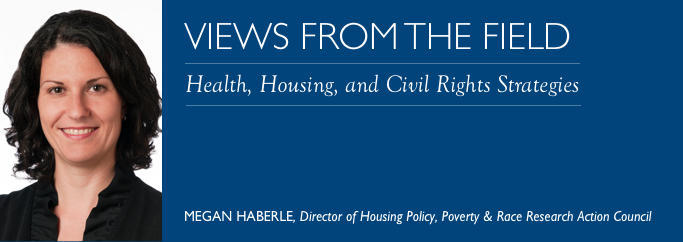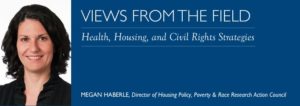
Grantmakers, practitioners, and advocates have recognized the role of place in shaping health, and know that there is a growing urgency to respond to inequities related to housing, residential segregation, and neighborhood conditions. This urgency is likely to soon be compounded by the emerging issue of climate change and the health effects it will have on already vulnerable neighborhoods.
Climate change will have direct impacts on health, with vulnerable communities on the frontline. Severe changes to weather patterns (such as heat waves and drought), flooding, and infrastructure will have significant health effects in relation to housing instability, access to healthy and affordable food, access to recreation, and other needs that already vary strongly across zip codes. As fair housing advocates and others can attest, racially segregated neighborhoods are too often the ones most at risk. These neighborhoods have long histories of being underresourced and undercapitalized, and they are already weighted with cumulative health impacts.
The existing advocacy movement to address place-based inequality and its root causes of concentrated poverty and segregation will play a fundamental role in ensuring that this new challenge is addressed both proactively and equitably.
Civil rights laws can offer an important platform for improving the health and well-being of vulnerable communities. These laws potentially offer vital protections against, for example, discrimination in municipal services, affordable housing siting, location of environmental health burdens, and other activities that affect families’ health and will intersect directly with climate change and its impacts. Despite their importance, many of these legal tools are underrealized or under threat. Yet there is a strong advocacy foundation that can be built upon to equip communities to respond to emerging challenges.
Funders can play a fundamental role in building a stronger civil rights infrastructure to improve the health of communities. As many grantmakers seek innovative ways to address the social determinants of health, there is a tremendous opportunity to collaborate with partners in the housing and civil rights sectors. What are some gaps in this work, and how can funders support advocacy efforts that connect health, housing, and civil rights?
Support for Law Reform and Education
Civil rights laws can protect families from unequal treatment by federal, state, and local governments in the distribution of health burdens and benefits, and can also be used for affirmative change. Yet looming federal program and legal services cuts indicate the need for vigilance when it comes to rights protection. At the same time, changes in infrastructure policy and budgeting indicate a need for oversight so this new activity occurs equitably.
On both the local and national levels, fair housing, environmental justice, and other civil rights groups are working to preserve existing federal protections and to improve state and local ones. While civil rights tools have enormous potential to address the upstream factors that shape health, it will be challenging to use these tools effectively without robust legal advocacy, including strong individual client representation, combined with community lawyering, and systemic legal advocacy.
Additionally, there is a need to expand public awareness of the opportunities that civil rights laws offer for vulnerable communities. Funders can aid these efforts by building capacity for community engagement and supporting communications strategies and public media campaigns, in connection with legal advocacy efforts.
Building the Case with Data
In many regions, there are inadequate parcel-level data to understand neighborhood health disparities in housing quality, environmental benefits and burdens, and other determinants of health. Parcel data captures the characteristics of individual land parcels, which also reveals neighborhood-to-neighborhood patterns. This data can be crucial for both policymakers’ and advocates’ work, for example to target resources where they are most needed or to support court cases where necessary. Yet underfunded community based groups often bear the costs of generating this information. More accessible data can support people-based planning and be a powerful way to drive equitable public investments—especially when connected with capacity-building related to community development strategies, fair housing planning, and litigation needs.
Parcel-level data mapping in particular can capture information on issues such as properties in need of weatherization, patterns in maintenance and infrastructure investment, or risk of lead exposure or other environmental health risks. This supports advocacy in areas such as:
- equitable climate change mitigation strategies and infrastructure investments,
- fair and transparent mechanisms for distribution of community development,
- resources to support property remediation,
- civil rights protection, for example by documenting racial disparities in municipal service policies (such as flood control), and
- environmental justice reviews and health impact assessments of proposed infrastructure projects.
Health philanthropy can play an important role in using data to support advocacy. Funders can invest in parcel-level data production and in the development of related policy tools, such as health impact assessments. Such data can enable sharper, smarter civil rights protections that reflect the realities on the ground.
State and Local Planning Frameworks
As awareness of climate change grows, so does the movement for related policy and planning efforts. Many states and localities now have climate change plans in place. Yet there has been little connection between these planning efforts and the field of civil rights and fair housing advocacy, despite the emerging need for equitable land use and housing policies that specifically account for climate change.
For instance, climate change plans (as well as other land-use plans) can be informed by the Assessment of Fair Housing (AFH) process pioneered in 2015 by the U.S. Department of Housing and Urban Development (HUD). The AFH documents localized barriers to fair housing and incorporates an “opportunity analysis” that examines access to environmental health, as well as the distribution of affordable housing and demographic trends. It requires that HUD recipients use both data and community participation to set fair housing goals and inform their planning processes—potentially including health and climate change plans. The AFH enables participants to document the root causes of separate and unequal conditions and, most importantly, commit to concrete solutions. Its potential is still being developed on the ground by local communities.
For example, advocates in Texas and New Jersey have effectively used civil rights laws to ensure that funds earmarked for homeowner relief and infrastructure improvements after Hurricanes Ike and Sandy were equitably redirected to help the most vulnerable communities, that were often in the direct path of climate change impacts.
Funders can support these efforts by investing in training for environmental and public health officials, advocates, and researchers on fair housing frames and the potential of the AFH planning process to improve community health. Funders can also support public participation efforts and civil rights technical assistance for policymakers and community organizations.
Conclusion
This is a critical time to foster collaboration between the health, housing, and civil rights sectors. Such collaboration and capacity-building will help communities address the health inequities linked to housing, residential segregation, and neighborhood conditions, and enable them to respond to new health issues such as those created by climate change. By joining forces, funders and advocates can respond to new developments while continuing to drive lasting structural change.

